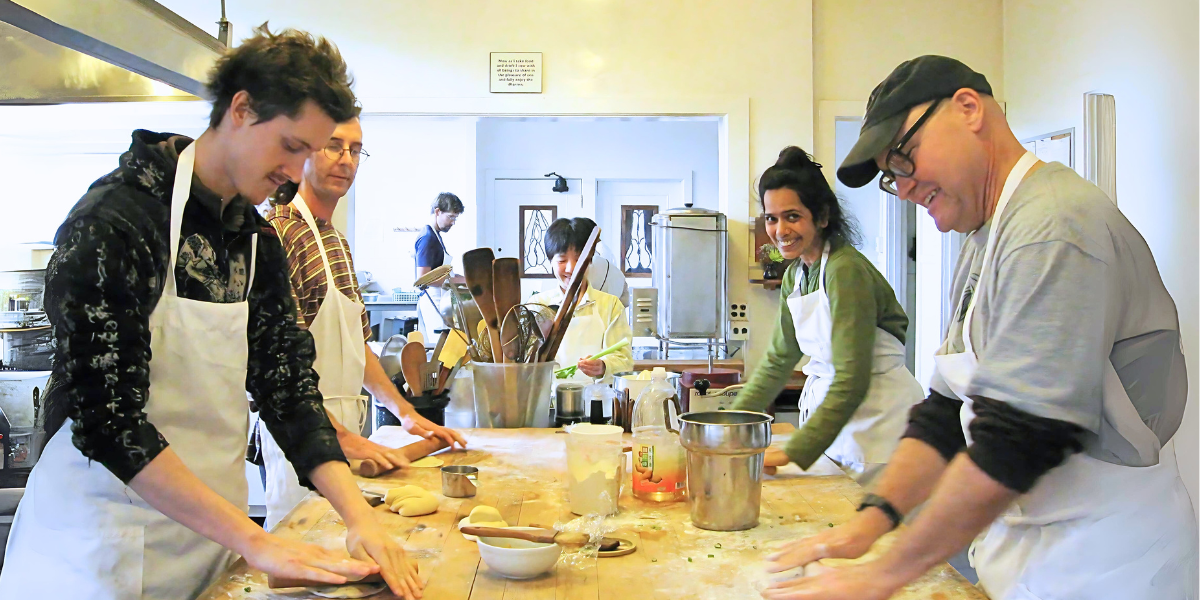
The City Center Zen Kitchen Apprenticeship is a three- to six-month program that provides an introduction to vegetarian cooking in a Zen kitchen, integrating Buddhist practice into every aspect of the work.
The Apprenticeship provides an immersive experience into temple life. Apprentices have the opportunity to practice zazen, engage in ceremonial life, meet with Zen teachers, and connect with a vibrant sangha in the heart of San Francisco. Most importantly, it offers an opportunity to study the self in the reflection of each activity. This apprenticeship can be done on its own, or it can be extended into the two-year Work Practice Apprenticeship.
Kitchen Work as Practice
Temple work has been at the heart of Zen Buddhism for a millennium, becoming essential as Buddhism traveled from the alms culture of South Asia into China. Immersion in a Buddhist kitchen involves wholehearted engagement in the tasks at hand, as well as attention to detail and a commitment to maintaining a harmonious workplace. Apprentices have the opportunity to learn how to apply Buddhist principles in the day-to-day practice of preparing and offering food to visitors and residents.
Formal Zen meditation and training is the foundation of community life at City Center and is an integral part of the Zen Kitchen Apprenticeship. Apprentices follow the daily temple schedule, which includes sitting meditation, services, and temple cleaning (soji). The Zen Kitchen Apprenticeship requires a commitment to the following practice activities:
- Early morning zazen, service, and temple cleaning six days per week
- 30 hours of work-practice per week (M–F, 9:00 am–12:30 pm and 4:00–6:30 pm)
- Participation in practice periods and practice period classes
- Regular private meetings with a resident practice leader
- Monthly one-day sittings
- Scheduled sesshins, depending on work and practice assignments
- Saturday morning and Wednesday evening Dharma talks
- Various monthly and yearly ceremonies and events
In addition, kitchen apprentices study Dogen Zenji’s “Tenzokyokun” (“Instructions to the Cook”) and meet regularly with practice leaders who are available to help clarify connections between working in the City Center kitchen and “cooking your life.”
The work at City Center can be demanding, requiring an open mind and heart, and a positive attitude. The emphasis of the kitchen apprenticeship isn’t on learning every detail of the culinary arts or how to be a star chef, but rather to immerse fully in the simplicity of chopping carrots or washing pots. In a Zen kitchen, being open to experiencing whatever arises counts as much as culinary expertise.
To Apply
|
Health and Safety
City Center is a congregate living facility which includes high risk individuals. We strongly recommend that everyone entering residential life be Covid-vaccinated with boosters. This is not a requirement. New students will be asked to test before coming and three days after arrival.
Diversity, Equity, Inclusion, and Accessibility
At SFZC, we recognize that diversity practice and Dharma practice are deeply interconnected. DEIA work is an essential part of our practice, enabling us to study our own conditioned and discriminating minds, as well as the conditions that give rise to harm, suffering, and collective inequities. Through this work, we deepen our understanding of the causes of suffering and foster greater awareness of how harm occurs. SFZC is committed to engaging in practice, conversation, and study to further embody diversity, inclusion, equity, and cultural humility.
As students of the Dharma, we aspire to view all beings as Buddha, treating everyone with care and respect. City Center welcomes people of every gender, age, race, ethnicity, class/income level, sexual orientation, political belief, language spoken, and physical ability, and we will strive to accommodate the requests of the sangha.
City Center CookingFor over 50 years, cooking has nourished the growth of Zen Buddhism in America. The inspiration for City Center’s food and cooking style comes from Eihei Dogen Zenji, the 13th century founder of Zen Buddhism in Japan. Dogen so revered the teaching he received from monastery cooks that he wrote a set of instructions for running the kitchen—the Tenzo Kyokun. Shunryu Suzuki Roshi, the founder of San Francisco Zen Center, supported creative expression in all aspects of life, including in developing the cooking style of the Zen Center kitchen. The founding generations of San Francisco Zen Center cooks created fresh styles of vegetarian cuisine, emphasizing mindful preparation and joyful activity. Many went on to change the way people think about vegetarian cooking: this includes Edward Espe Brown (author of The Tassajara Bread Book), Annie Somerville (former executive chef of Greens Restaurant and author of cookbooks based on Greens’ recipes), and Deborah Madison (author of Vegetarian Cooking for Everyone). City Center continues to produce joyful vegetarian food while maintaining a distinct Zen kitchen culture. Purchasing guidelines ensure that the majority of our food is organic, local, and made from scratch. |
I could not be more grateful for the time I spent as part of the kitchen crew during my stay at SFZC…I found that it is possible to practice zazen while cooking, lifting heavy pots, prepping food and doing dishes. It was fun, communal, engaging, and just downright amazing! Thank you SFZC! —Sallamah
The kitchen is a dojo, it is a training place where practice lives in every act…wash rice, chop vegetables, mix condiments, clean utensils, sweep the floor, get everything ready at the appointed time. In silence, with concentration on posture and full attention to the present. Therefore, more than preparing food, in the kitchen we prepare offerings to the Buddha, the Dharma, and the Sangha. —Ryushu Juan Andrés Ferreira